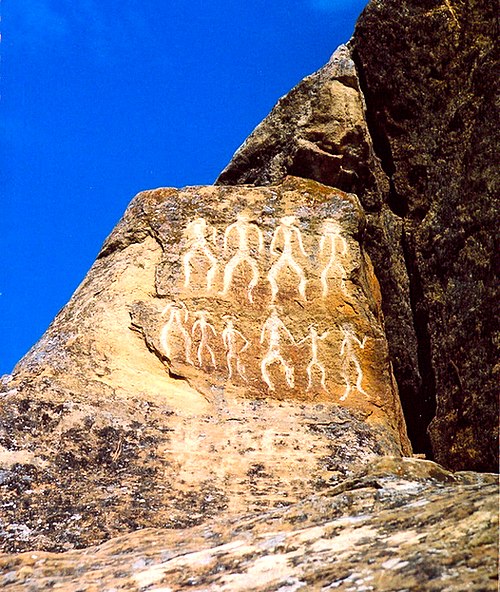Religionnoun
(uncountable) The belief in a reality beyond what is perceptible by the senses, and the practices associated with this belief.
Religionnoun
(countable) A particular system of such belief, and the rituals and practices proper to it.
Religionnoun
(uncountable) The way of life committed to by monks and nuns.
Religionnoun
(countable) Any practice to which someone or some group is seriously devoted.
Religionnoun
Faithfulness to a given principle; conscientiousness.
Religionverb
Engage in religious practice.
Religionverb
Indoctrinate into a specific religion.
Religionverb
To make sacred or symbolic; sanctify.
Religionnoun
The outward act or form by which men indicate their recognition of the existence of a god or of gods having power over their destiny, to whom obedience, service, and honor are due; the feeling or expression of human love, fear, or awe of some superhuman and overruling power, whether by profession of belief, by observance of rites and ceremonies, or by the conduct of life; a system of faith and worship; a manifestation of piety; as, ethical religions; monotheistic religions; natural religion; revealed religion; the religion of the Jews; the religion of idol worshipers.
Religionnoun
Specifically, conformity in faith and life to the precepts inculcated in the Bible, respecting the conduct of life and duty toward God and man; the Christian faith and practice.
Religionnoun
A monastic or religious order subject to a regulated mode of life; the religious state; as, to enter religion.
Religionnoun
Strictness of fidelity in conforming to any practice, as if it were an enjoined rule of conduct.
Religionnoun
a strong belief in a supernatural power or powers that control human destiny;
Religionnoun
institution to express belief in a divine power;
Religion
Religion is a social-cultural system of designated behaviors and practices, morals, beliefs, worldviews, texts, sanctified places, prophecies, ethics, or organizations, that relates humanity to supernatural, transcendental, and spiritual elements; however, there is no scholarly consensus over what precisely constitutes a religion.Different religions may or may not contain various elements ranging from the divine, sacred things, faith, a supernatural being or supernatural beings or . Religious practices may include rituals, sermons, commemoration or veneration (of deities and/or saints), sacrifices, festivals, feasts, trances, initiations, funerary services, matrimonial services, meditation, prayer, music, art, dance, public service, or other aspects of human culture.
Culturenoun
the arts, customs, lifestyles, background, and habits that characterize a particular society or nation
Culturenoun
the beliefs, values, behaviour and material objects that constitute a people's way of life
Culturenoun
(anthropology) any knowledge passed from one generation to the next, not necessarily with respect to human beings
Culturenoun
(botany) cultivation
Culturenoun
(microbiology) the process of growing a bacterial or other biological entity in an artificial medium
Culturenoun
the growth thus produced
Culturenoun
the collective noun for a group of bacteria
Culturenoun
(cartography) the details on a map that do not represent natural features of the area delineated, such as names and the symbols for towns, roads, meridians, and parallels
Cultureverb
(transitive) to maintain in an environment suitable for growth especially of bacteria cultivate}}
Cultureverb
(transitive) to increase the artistic or scientific interest in something cultivate}}
Culturenoun
The act or practice of cultivating, or of preparing the earth for seed and raising crops by tillage; as, the culture of the soil.
Culturenoun
The act of, or any labor or means employed for, training, disciplining, or refining the moral and intellectual nature of man; as, the culture of the mind.
Culturenoun
The state of being cultivated; result of cultivation; physical improvement; enlightenment and discipline acquired by mental and moral training; civilization; refinement in manners and taste.
Culturenoun
The cultivation of bacteria or other organisms (such as fungi or eukaryotic cells from mulitcellular organisms) in artificial media or under artificial conditions.
Culturenoun
Those details of a map, collectively, which do not represent natural features of the area delineated, as names and the symbols for towns, roads, houses, bridges, meridians, and parallels.
Cultureverb
To cultivate; to educate.
Culturenoun
a particular society at a particular time and place;
Culturenoun
the tastes in art and manners that are favored by a social group
Culturenoun
all the knowledge and values shared by a society
Culturenoun
(biology) the growing of microorganisms in a nutrient medium (such as gelatin or agar);
Culturenoun
(bacteriology) the product of cultivating micro-organisms in a nutrient medium
Culturenoun
a highly developed state of perfection; having a flawless or impeccable quality;
Culturenoun
the attitudes and behavior that are characteristic of a particular social group or organization;
Culturenoun
the raising of plants or animals;
Culture
Culture () is an umbrella term which encompasses the social behavior and norms found in human societies, as well as the knowledge, beliefs, arts, laws, customs, capabilities, and habits of the individuals in these groups.Humans acquire culture through the learning processes of enculturation and socialization, which is shown by the diversity of cultures across societies. A cultural norm codifies acceptable conduct in society; it serves as a guideline for behavior, dress, language, and demeanor in a situation, which serves as a template for expectations in a social group.


































